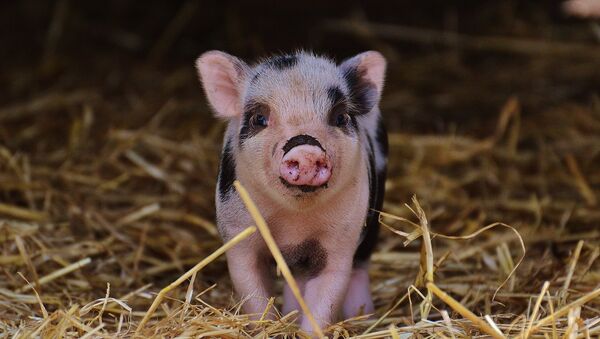Transplanting organs from pigs is a long-held ambition of scientists the world over — perhaps unsurprising, as around 22 people die daily in the US alone on average waiting for various organs to become available.
While the practice has been successfully achieved on a number of occasions, one hurdle that has hitherto prevented the widespread adoption of the practice is the existence of PERVs — porcine endogenous retroviruses. These vestiges of ancient viral infections, are scattered throughout a pig's genome, and can infect anyone who one day receives a pig's heart, lung, or kidney as a replacement or temporary organ.
Published today in @sciencemagazine, eGenesis produced the first pigs without active porcine endogenous retrovirus: https://t.co/xDLoJumeeH
— eGenesis (@eGenesisBio) August 10, 2017
While the potential impact of PERVs on humans is largely speculative — scientists don't know for certain whether the viral particles they produce can infect humans (they certainly infect cells in laboratory experiments) much less whether they would cause disease if they did — concerns have been suitably concrete to keep pig organs off the table as human replacements for decades. Previous attempts to excise PERV genes from pig cells with an editing technology called "zinc finger nucleases" were unsuccessful, due to the imprecision of the technique.
Now though, the Harvard team has used CRISPR gene editing to create dozens of apparently healthy pigs with no trace of PERV genes. The Harvard University geneticists were led by George Church and Luhan Yang, both early developers of CRISPR — they postulated CRISPR could make precise, genome-wide changes to pig cells, and in 2015 showed it could indeed could knock out PERV genes at all 62 sites in a pig genome.
However, that project was relatively modest — the researchers conducted tests on a line of pig kidney cells (known to survive and divide indefinitely in a dish) under laboratory conditions. To make bona fide PERV-free porncines, they needed to use genetically normal cells taken from a living pig — in the end they applied CRISPR to cells derived from the connective tissue of fetal pigs.
22 people die each day waiting for an organ. eGenesis is using #CRISPR to deliver safe organs for transplant: https://t.co/Sfe5iYiox6
— eGenesis (@eGenesisBio) July 10, 2017
This batch proved more fragile when subjected to CRISPR's hack job. Once edited, they failed to grow normally — but by exposing the cells to a chemical mix that encouraged growth, the team increased the portion of flourishing PERV-free cells in dishes to 100 percent.
To produce piglets, the researchers then employed a standard cloning technique, inserting the DNA-containing nuclei of these edited cells into egg cells taken from the ovaries of pigs at a Chinese slaughterhouse, which allowed each egg to develop into an embryo and implanted it in the uterus of a surrogate mother.
The technique produced live, apparently healthy pigs with roughly the same success rate as the cloning method without genetic modification-about one pig per 100 implanted embryos. When they tested tissues from the 37 piglets born so far, all were PERV-free.
However, even if PERVs are off the table, pigs will require other modifications so their organs won't be rejected by the human immune system or cause other harms — for instance, genes will prevent toxic interactions with human blood will need to be inserted. Still, the breakthrough represents a major first step towards tackling the world's chronic transplantable organ deficiency issue — and the end of PERVs forevermore.


